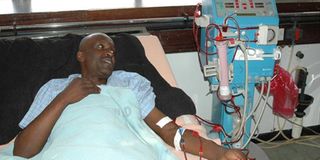Hope for patients in Sh2bn cancer, dialysis facility

A kidney patient undergoes dialysis at Kenyatta National Hospital. FILE PHOTO |
What you need to know:
- Mr Mogaka said he spent an estimated Sh10 million on dialysis, which has impoverished him.
- Mr Mogaka would spend a further Sh30,000 on trips to Nairobi.
- In June last year, the national government signed a $200 million (about Sh2 billion) loan agreement with a Kuwait-based bank to help in the establishment of a cancer and dialysis treatment centre in the county.
Mr Andrew Mogaka, 54, is enjoying a new lease of life.
The resident of Nyabiemba village, Nyansiongo Ward, Borabu Sub-County in Nyamira County was diagnosed with kidney failure nine years ago.
At the time, the nearest dialysis machine was at the Moi Teaching and Referral Hospital in Eldoret. The other was at the Kenyatta National Hospital in Nairobi.
“I used to spend between Sh9,000 and 20,000 per dialysis session at KNH,” he told the Nation recently.
Mr Mogaka would spend a further Sh30,000 on trips to Nairobi.
He would then have to endure the painful wait for treatment at KNH. Often, he would be forced to seek the service in a private hospital on account of the queue being too long.
“I saw some of my colleagues collapse and succumb to kidney failure as we waited our turn at the dialysis machine, which could only serve six patients at a time,” Mr Mogaka reminisced. “I went into coma several times during that period.
“It is only by God’s grace that I survived those tough, uncertain times.”
Mr Mogaka said he spent an estimated Sh10 million on dialysis, which has impoverished him.
The tea farmer is just one of the many patients across the county that queue daily at the Kisii Teaching and Referral Hospital’s (KTRH) dialysis section.
In June last year, the national government signed a $200 million (about Sh2 billion) loan agreement with a Kuwait-based bank to help in the establishment of a cancer and dialysis treatment centre in the county.
RENAL DIALYSIS
Funded by the Arab Bank for Economic Development in Africa and the Saudi Fund, the project will enable KTRH to establish the country’s third public facility of that nature.
Even though a ray of hope shone into his and the other patients’ lives three years ago with the establishment of the renal dialysis unit at the hospital, it is not enough.
“Previously, patients would be forced to travel to Eldoret or Nairobi for dialysis,” said Dr Enoch Ondari, the hospital’s CEO. “Some of them would even die in the ambulance on the way there.”
Dr Ondari added: “We are able to carry out 32 sessions a week.
“The figure could be higher if we had more machines and nurses but we are so far unable to do so because of financial constraints. The machines cost Sh2 million to Sh5 million each.”
Going by our calculations, should the county staff decide to forgo their coffee, tea and lunch budget, the money will be enough to purchase between two and five brand new dialysis machines to assist more patients who cannot afford treatment elsewhere.
The county’s budget allocation to hospitality supplies and services is Sh9.5 million.
The most effective and commonly prescribed medication for the treatment of uncomplicated malaria is Artemisinin-based combination therapies (ACTS), which cost between Sh200 and Sh250 for an adult treatment dose.
With Sh9.5 million, the county can have 47,500 malaria cases treated. This financial year, it has allocated Sh324 million to health.






